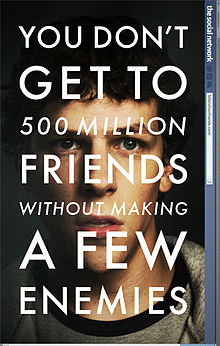
Near the end of The Social Network, Mark Zuckerberg is worried that the legal proceedings are making him look like the bad guy. So the young lawyer played by Rashida Dati (whom my wife and I have come to know from watching the US version of The Office) assures him that whenever emotional testimony is involved in a case, she automatically assumes that 85% of it is exaggerated and 15% of it is pure perjury. As strange as it seems, all clues point to the writer deliberately inserting this phrase to refer to the film itself.
I’d put off watching this for a very long time even after reading numerous favorable reviews of it. I kept thinking, “It’s a movie about a kid in college building a gigantic social networking website. How entertaining could it be?” I was wrong because this turned out to be one of the most riveting and entertaining films I’ve watched in recent memory. But a quick check on Wikipedia suffices to reveal that it achieves this by the simple expedient of taking tons of liberties with the facts. Even its writer Aaron Sorkin admits that he wanted to tell an interesting story first and foremost and this film isn’t meant to be a historically accurate documentary.
How egregious are these inaccuracies? To start with, there’s the fact despite being the primary motivation for Zuckerberg’s actions in the film, the character of Erica Albright seems to have been invented. The character may be based on a real-life character, but there’s no evidence for that. In fact, Zuckerberg’s current girlfriend is someone he’s been with since his college days, predating the creation of Facebook, but there’s no such character in the film. Then there’s the fact that Sean Parker was never a founder of Napster. Instead, he was an early employee. True, the story flows much more smoothly if Parker had actually founded Napster but the fact is that he didn’t.
Numerous other small fabrications combine to make Zuckerberg more of a villain. In the film, he creates FaceMash out of spite after being dumped by a girl with the intention of denigrating female students. In real life, FaceMash allowed users to rate photos of both male and female students. The idea for Facebook itself seems to clearly come from the Winklevoss twins in the film. In reality, the idea of a social networking website was nothing new at the time. Both Friendster and MySpace predated Facebook. Facebook won the war not because it was the first, but because it was and continues to be the best.
The Social Network is still an eminently watchable film despite its lack of fidelity to history but it’s hard to shake the feeling that the reason most people would want to watch it in the first place is because they’re curious about the story behind what has become an essential tool in their everyday lives. Since most people won’t bother to fact-check the film after watching it, it’s obvious that many people are going to walk away with a very misleading picture of what actually happened. Quite a few reviewers have called this film the Citizen Kane of the Internet age, but at least in that classic Orson Welles was clever enough to create a fictionalized character that everyone knew was only loosely based on the real-life William Hearst.
Finally, after hearing numerous praises about Sorkin’s writing on QT3, this is actually the first time I’ve watched something he’s written as I haven’t seen The West Wing at all. I have to admit that the snappy dialogue is infectiously attractive and fun to hear even if it is sometimes too clever by half. As for the direction, despite its subject matter being unlike anything he’s done before, this is still recognizably a David Fincher film. I was pretty disappointed with how stereotypical Benjamin Button turned out to be, but this is a solid return to his previous form. Final verdict: definitely watch this film but don’t believe anything it says.
i will get very personal with what you have to say about Benjamin Button
Benjamin Button was decent entertainment but was too stereotypically maudlin to be considered a good film. It’s a very archetypal Hollywood tearjerker. It was also a very uncharacteristically David Fincher film, so much so that many critics thought that Fincher must have allowed his second unit director to make most of the film. Finally, it’s too similar to Forrest Gump, which is especially unforgivable because it was written by Eric Roth, who wrote the screenplay for both films. It’s as if Roth wanted to revisit the success of Forrest Gump by making an almost identical film.
OK..I will call in Eli Roth..
you never watch west wing? come on, that was one of the good TV series around.
Maybe I should get a copy of the social network movie. Very reluctant to watch in the first place.
Khoo : Thought you are solely engross in Dexter.. :p